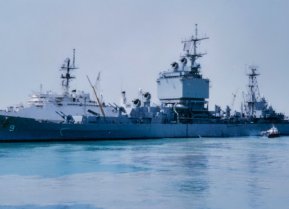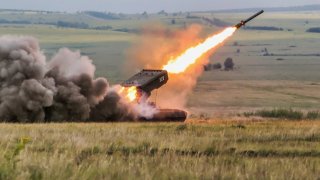What Does Victory Look Like for Ukraine Against Russia?
Losing Crimea under such depressing conditions would be equivalent to a disaster for Putin and his fascist regime, and a victory for Ukraine that would enable it to retake the initiative along the entire front.
What would spell defeat for Russian President Vladimir Putin in Russia’s genocidal war against Ukraine?
Obviously, driving the Russian armed forces out of all of Ukraine would qualify. However desirable that goal is, though, it is not necessary to meet the definition. Further, that kind of victory would take resources that Ukraine might not have. It would take time, during which more Ukrainian civilians would die and more Ukrainian cities would be destroyed.
Stolen Histories
Is there a better, less costly, and equally effective way of defeating Russia’s illegitimate president and his regime? Yes, there is. After all, why attempt to liberate all the territories Russia currently occupies, if liberating some part of them would deal the same damage to the Putin regime? The logical follow-up to that suggestion is to ask, which part? The answer is obvious: Crimea.
Russians have no particular emotional attachment to Luhansk, Donetsk, Zaporizhzhia, and Kherson provinces, all of which are partially occupied by Russian forces – some since 2014, others since 2022. The Donbas region is a depopulated wreck, and who knows how many of its residual residents still support Russia.
The Crimean peninsula is different. Right or wrong, Russians genuinely believe that this territory matters to their self-identity. One Ukrainian analyst has said that “Crimea is a sacred territory for some in the Kremlin. And whoever owns it may determine the position and life of the owner of the Kremlin.”
Crimea has been home to the Black Sea Fleet since the late 18th century. It was the site of the Crimean War in the 1850s, and of a number of heroic battles during World War II.
After Stalin ethnically cleansed the Crimean Tatars in 1944, the province was settled with large cohorts of patriotically inclined veterans who thoroughly Sovietized and Russified the peninsula. Throughout the Soviet period and the three decades that have followed, Crimea has attracted millions of Russian vacationers who blithely disregard the fact that they carouse amid Crimean Tatar graves.
Subliminal guilt over the criminal destruction of Crimean Tatar culture may have marginally contributed to the widespread belief that Crimea always was Russian and must stay so at all costs. Small wonder that Putin, in justifying his invasion of Crimea in February 2014, invoked history, saying:
“Everything in Crimea speaks of our shared history and pride. This is the location of ancient Khersones, where Prince Vladimir was baptized…. The graves of Russian soldiers whose bravery brought Crimea into the Russian empire are also in Crimea. This is also Sevastopol – a legendary city with an outstanding history, a fortress that serves as the birthplace of Russia’s Black Sea Fleet. Crimea is Balaklava and Kerch, Malakhov Kurgan and Sapun Ridge. Each one of these places is dear to our hearts, symbolizing Russian military glory and outstanding valor.” Small wonder as well, that, according to Russia’s great leader, “In people’s hearts and minds, Crimea has always been an inseparable part of Russia.”
Strategic Supremacy
It matters little that Putin’s history is dead wrong on various counts. What matters is that Russians have a deep attachment to Crimea. Losing the peninsula would be almost as humiliating and delegitimizing for Putin and his supporters as losing all of Ukraine. It would be tantamount to losing the war. It would weaken Putin and possibly lead to his political – and physical – end.
The uptake for Ukraine is obvious: it should focus its efforts on driving Russia out of Crimea.
That does not mean forgetting the other occupied territories, but it does mean placing them lower on the list of priorities and concentrating Kyiv’s limited resources on Crimea. After all, if losing Crimea speeds the war to an end, then the job of liberating the rest of southeastern Ukraine will be significantly easier. It might even be attained through negotiations with whomever succeeds Putin.
Moreover, Crimea is strategically important and easier to attack than the Donbas or Southern Ukraine.
“Crimea is decisive for this war,” retired U.S. Lt. Gen. Ben Hodges, former commander of the U.S. Army in Europe, has said. “Ukraine will never be safe or secure, or be able to rebuild their economy, as long as Russia retains Crimea…. And I think increasing numbers of people are recognizing not only the necessity of [retaking Crimea], but also the feasibility.”
Do to Crimea What Has Been Done Before
Whoever controls Crimea controls both the Sea of Azov and the Black Sea.
Crimea is connected to the Ukrainian mainland by a narrow isthmus and to the Russian mainland by the Kerch Bridge. The peninsula is far more vulnerable to encirclement than occupied territories that lie north of Crimea or that border on Russia.
Ukraine’s short- and medium-term goal need not be to capture Crimea, but to make it untenable for Russia. Storming Crimea with troops would be costly and risky, but cutting it off from Russia is perfectly possible and would be no less effective. Kyiv should take its inspiration from ancient and medieval history: Treat Crimea as a city that must be placed under siege and squeezed to the point of surrender.
As Hodges puts it, “liberating Crimea begins with the isolation of the peninsula by severing the land bridge and the Kerch Bridge.” John Spencer, retired U.S. Army major and chair of Urban Warfare Studies at the Madison Policy Forum, concurs.
“If Ukraine can make it untenable for the Russian military to stay in Crimea, they will have to leave,” Spencer says. “Like we have already seen, Ukraine can do this with attacks by resistance forces, special forces, and through long-range fires.”
The operative phrase is “like we have already seen.” Ukraine and its Crimean guerrilla allies are already making life difficult for the Russian armed forces based in Crimea. The Black Sea Fleet has been forced to abandon Sevastopol and relocate to Novorossiysk, effectively abandoning control of the Black Sea. As Ukraine and Russia expert Rajan Menon points out, Ukraine has attacked several key air force bases in Crimea and is well positioned to continue doing so. The Kerch Bridge has been assaulted several times, while railroad connections to Crimea in southern Ukraine are within close range of Ukrainian drones and missiles.
If Ukrainian attacks continue, and if the Kerch Bridge is made inoperable, then, short of a Berlin airlift-style operation, Russia will be unable to hold Crimea. Unsurprisingly, average Russians know which way the wind is blowing: Tourism has plummeted, and local residents are leaving Crimea for colder but safer climes.
Ukrainians appear to understand that Crimea holds the key to victory. According to Ukrainian intelligence head Kyrylo Budanov, Ukraine is making “preparations for a serious operation in Crimea.”
Just what that means is unclear, but given the current constraints on Ukraine’s capacity to engage in offensive actions, the operation will likely aim at isolating, degrading, and diminishing the Russian presence in Crimea. Crimea is vulnerable to a siege because it is a peninsula, because there are only two ways of supplying it (via the Perekop Isthmus and the Kerch Bridge), and because Russia no longer controls the Black Sea.
Humiliating Putin
At some point, regardless of how untenable Crimea becomes for the Russians, Ukrainian forces will have to physically occupy the peninsula. But the beauty of the untenability approach is that Ukraine need not hurry. Crimea will be more likely to surrender the longer the siege lasts. Moreover, the longer the siege lasts, the worse it is for Putin’s claims of invincibility.
The untenability approach also has the advantage of not providing Putin with a pretext for escalating and rattling nuclear sabers. After all, it is not Ukrainians who would be occupying sacred Crimea – it is Russians who would be leaving it.
Although the goal can be accomplished by Ukraine continuing to act as it is now, it would obviously help if the West provides Kyiv with the armaments it needs to hold the front in the coming months and focus on Crimea. As Ukrainian officials emphasize, this means that, in addition to F-16 fighter jets, artillery shells, and ATACMS ballistic missiles, “Kyiv is seeking drones for surveillance and long-range strikes, followed by electronic warfare systems to jam the Russian drones and ballistic missiles targeting Ukrainian front lines and civilian infrastructure.”
Making Crimea untenable will take time, but time is not on Russia’s side. Its economy is heading toward crisis, if not collapse, and Putin does not know how to fix it. His plans to nationalize industries and increase taxes to pay for his military ambitions will only make things worse. The number of Russians who have died or wounded in the war is approaching half a million. Russia’s generals may not care about the human losses, but they surely care about the creeping collapse of the second most powerful army in the world.
Losing Crimea under such depressing conditions would be equivalent to a disaster for Putin and his fascist regime, and a victory for Ukraine that would enable it to retake the initiative along the entire front. The West, still so skittish about seeing a resounding Ukrainian victory, could finally stop holding its breath and cheer Putin’s humiliation.


